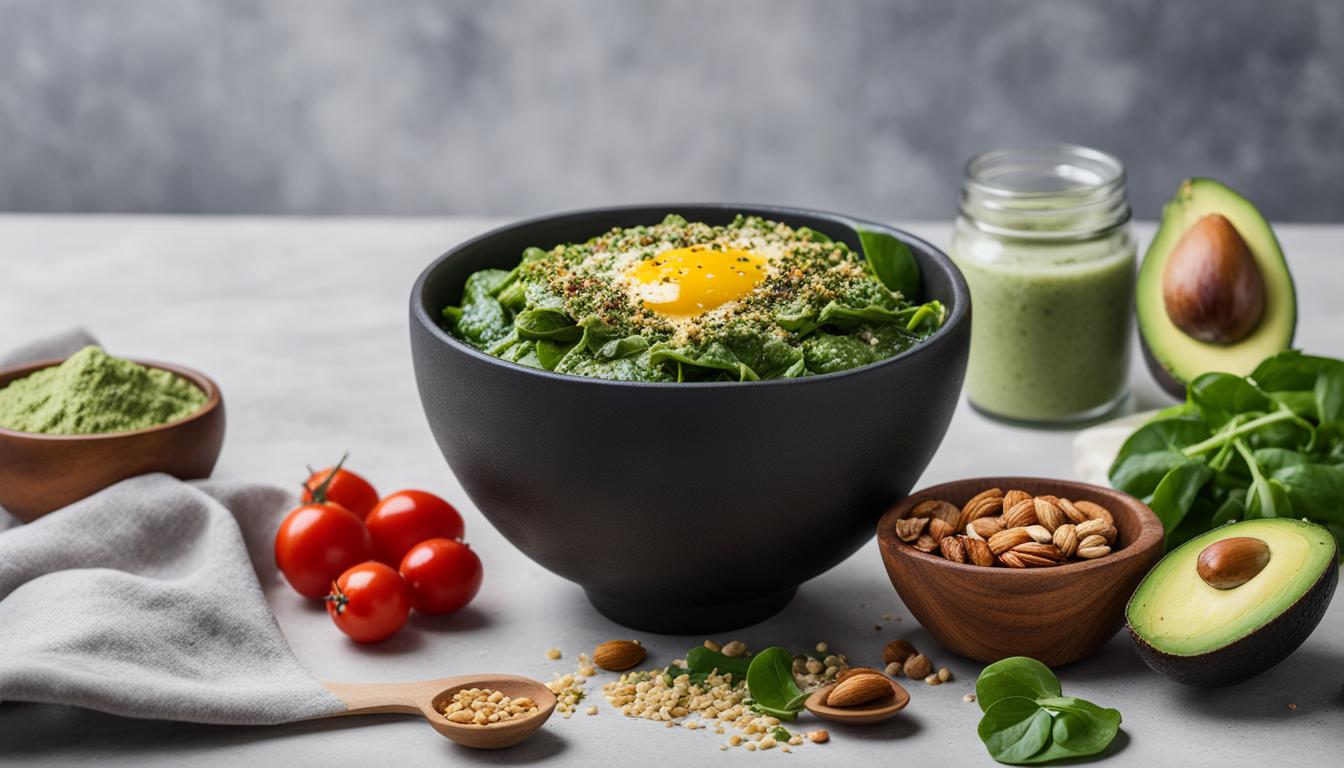Discover the Secret to Success on a Keto Diet with Lactose-Free Milk: Everything You Need to Know!
Why the Keto Diet is So Popular
Have you ever wondered what makes the keto diet so popular? The ketogenic diet, or keto diet, has been making waves in the health and wellness world for quite some time now. And it’s no surprise! The appeal of the keto diet lies in its incredible potential to help individuals achieve their health and weight loss goals.
But what exactly is the keto diet? Well, it’s a low-carb, high-fat diet designed to switch the body’s metabolism from using carbohydrates for energy to using fat. This process, known as ketosis, has been shown to offer a wide array of health benefits, including weight loss, improved mental focus, and enhanced energy levels.
Research published in the European Journal of Clinical Nutrition confirmed that the ketogenic diet can lead to greater weight loss compared to a low-fat diet. Furthermore, the journal Obesity Reviews highlighted that the keto diet can effectively reduce risk factors for heart disease and enhance HDL cholesterol levels.
The surge in popularity of the keto diet can also be attributed to its flexibility. With a wide range of delicious and satisfying keto-friendly foods, including dairy products like cheese and yogurt, it’s a diet that doesn’t leave you feeling deprived.
The Increasing Demand for Lactose-Free Options
As the demand for keto-friendly products continues to rise, so does the need for lactose-free options. Many individuals are either sensitive to lactose or follow a dairy-free or lactose-free lifestyle. This has led to a significant uptick in the availability of lactose-free products, including milk.
So, what exactly is lactose-free milk? It’s essentially milk that has had the lactose, or milk sugar, removed. This process makes it easier for individuals with lactose intolerance to digest and enjoy milk without experiencing any discomfort.
A study in the Journal of Food Science and Technology indicated that lactose-free milk retains all the nutritional benefits of regular milk, making it an excellent source of calcium, vitamin D, and protein. Additionally, research from the Journal of the American College of Nutrition highlighted that incorporating lactose-free milk into a keto diet can provide a convenient source of high-quality, low-carbohydrate dairy.
It’s clear that the increasing demand for lactose-free options, particularly lactose-free milk, aligns perfectly with the goals and preferences of individuals following a keto lifestyle. Whether it’s due to lactose intolerance, personal dietary choices, or health considerations, the availability of lactose-free milk has undoubtedly made it easier for individuals to adhere to a keto diet while still enjoying the creamy goodness of milk.

What is Lactose-Free Milk?
Lactose-free milk is a popular choice for individuals who are lactose intolerant or have difficulty digesting lactose, which is a natural sugar found in milk. This milk is essentially the same as regular cow’s milk, but with the lactose removed. It’s an excellent option for those following a keto diet, as it’s lower in carbs and can be a great addition to a keto meal plan.
How is Lactose-Free Milk Made?
Lactose-free milk is made through a process that breaks down the lactose into two simple sugars, glucose and galactose, making it easier to digest for those with lactose intolerance. The most common method used to produce lactose-free milk is through the addition of the lactase enzyme. This enzyme breaks down the lactose into its simpler forms, effectively eliminating the lactose content in the milk.
Once the lactose has been broken down, the milk is then pasteurized to stop the action of the lactase enzyme and to ensure it is safe for consumption. The end result is a delicious, nutritious, and keto-friendly alternative to regular milk.
Notably, individuals following a keto diet can include lactose-free milk in their meal plans, as it is low in carbs and can be used in various keto recipes without compromising the macronutrient balance.
If you’re on a keto diet and looking for a dairy option that aligns with your dietary goals, lactose-free milk can be a fantastic choice to include in your daily routine.
Discussing Lactose-Free Milk in a Keto Diet
When it comes to the ketogenic diet, many of us focus on the macros, the types of fats, and the low-carb vegetables. But what about our drink choices? For those who are following a keto lifestyle but are also lactose intolerant, lactose-free milk is a great option that can fit well into your daily routine.
Now, let’s dive into how lactose-free milk can be a valuable addition to your keto journey and how it compares to traditional dairy milk.
Is Lactose-Free Milk Keto-Friendly?
For individuals adhering to a keto diet, the carbohydrate content of any food or beverage is of utmost importance. Lactose-free milk, just like regular cow’s milk, contains a natural sugar called lactose. However, the process of making it lactose-free involves breaking down the lactose into simpler sugars, making it easier to digest for those who are lactose intolerant.
From a keto perspective, lactose-free milk can be incorporated in moderate amounts due to its lower lactose content. It is essential to account for the carbohydrate content of lactose-free milk within your daily carb limit. Unsweetened versions of almond or coconut milk can also be suitable alternatives, providing fewer carbs and calories per serving.
The Benefits of Lactose-Free Milk on Keto Diet
Lactose-free milk offers several benefits for those following a keto diet. Firstly, it provides an excellent source of high-quality protein, essential for muscle repair and overall body function. Furthermore, the fat content in lactose-free milk, whether it’s whole or low-fat, contributes to the intake of healthy fats, a fundamental component of the ketogenic diet.
Additionally, lactose-free milk is fortified with essential nutrients such as calcium, vitamin D, and often vitamin A. These nutrients play a vital role in maintaining bone health and supporting the immune system, both of which are crucial considerations when following a restrictive diet such as keto.
Moreover, the consumption of lactose-free milk has been associated with improved gastrointestinal tolerance, making it an ideal choice for individuals with lactose intolerance who are also looking to maintain a ketogenic lifestyle. The availability of lactose-free milk varieties, including almond, soy, and coconut milk, cater to a wide range of dietary preferences while aligning with the principles of the keto diet.
Incorporating lactose-free milk into your keto meal plan can contribute to a well-rounded and sustainable approach to nutrition while accommodating lactose intolerance. Remember, moderation and mindful consumption are key aspects of successfully integrating any food or beverage into a keto diet, including lactose-free milk.
With the versatility and nutritional benefits of lactose-free milk, individuals following a keto lifestyle can enjoy this dairy alternative as part of their balanced and satisfying meal plan.

Nutritional Value of Lactose-Free Milk
Let’s take a deep dive into the nutritional value of lactose-free milk and compare it to regular milk, especially in the context of a keto diet. Understanding the differences can help you make the best choice for your health and wellness goals.
Lactose-free milk is regular cow’s milk that has been treated to break down the natural sugar, lactose, making it easier to digest for those who are lactose intolerant. In terms of macronutrients, lactose-free milk offers a similar profile to regular milk, with the key difference being the lactose content.
Comparing Nutritional Values
When comparing the nutritional value of lactose-free milk to regular milk, both are excellent sources of essential nutrients such as calcium, vitamin D, and protein. A cup of unsweetened lactose-free milk contains about 80 calories, 8 grams of protein, 2-3 grams of fat, and 6-8 grams of carbohydrates. On the other hand, a cup of whole milk contains roughly 150 calories, 8 grams of protein, 8 grams of fat, and 12 grams of carbohydrates. This means that lactose-free milk is lower in calories and carbohydrates than regular whole milk, making it a favorable choice for those following a keto diet.
Moreover, lactose-free milk often contains added vitamin D, which is essential for calcium absorption and overall bone health. This fortified option can be particularly beneficial for individuals who may have limited sun exposure or are looking to enhance their vitamin D intake while on a ketogenic diet.
It’s also important to note that some flavored or sweetened lactose-free milk products may contain added sugars or artificial sweeteners, which could impact their keto compatibility. Therefore, it’s advisable to opt for unsweetened varieties to minimize carbohydrate intake.
In conclusion, the nutritional value of lactose-free milk aligns well with the principles of a keto diet, offering a nutrient-dense, lower-carbohydrate alternative to regular milk without compromising essential vitamins and minerals.
Best Brands of Lactose-Free Milk for Keto Diet
When it comes to embracing the ketogenic lifestyle, finding suitable milk alternatives that are both low in carbs and free from lactose can be a game-changer. Fortunately, there are several popular brands of lactose-free milk available in the market that are perfect for those following a keto diet. Let’s delve into some of the top options that can elevate your keto-friendly beverage choices.
1. Almond Breeze Unsweetened Almond Milk
One of the frontrunners in the realm of lactose-free milk suitable for the keto diet is Almond Breeze Unsweetened Almond Milk. With negligible carbs and zero sugar, this creamy and delicious almond milk is an excellent choice for those looking to keep their carb intake in check. It also provides essential nutrients such as vitamin E and calcium, making it a wholesome addition to your ketogenic journey.
2. So Delicious Unsweetened Coconut Milk
Another standout option in the lactose-free milk domain is the So Delicious Unsweetened Coconut Milk. This keto-friendly milk alternative not only offers a rich and refreshing taste but also contains minimal carbs, making it an ideal choice for those aiming to stay in ketosis. Its versatility makes it perfect for both drinking and incorporating into a wide array of keto recipes, from smoothies to savory dishes.
3. Silk Unsweetened Cashew Milk
Silk Unsweetened Cashew Milk is also a stellar contender for individuals seeking a low-carb, lactose-free milk option. This creamy, plant-based milk is high in healthy fats and low in carbs, making it an excellent fit for a keto lifestyle. Whether you’re enjoying it in your morning coffee or using it as a base for keto-friendly soups and sauces, Silk Unsweetened Cashew Milk can elevate your culinary experiences while adhering to your dietary goals.
When selecting a lactose-free milk for your keto journey, it’s crucial to scrutinize the nutrition labels to ensure that the product aligns with your dietary requirements. Look for options that are unsweetened and devoid of added sugars, as these can spike insulin levels and hinder ketosis.
By incorporating these top-notch lactose-free milk brands into your keto repertoire, you can savor your favorite beverages and recipes while staying on course with your low-carb, high-fat lifestyle. Experiment with different varieties to find the perfect match for your taste buds and keto goals, and relish in the fact that you can enjoy creamy, indulgent milk without compromising your dedication to the ketogenic way of life.

Providing recipe ideas and tips for using lactose-free milk in keto-friendly dishes
Now that you know the benefits of incorporating lactose-free milk into your keto lifestyle, it’s time to explore some delicious recipe ideas and tips to make the most of this versatile ingredient.
Delicious Keto-Friendly Smoothies
One of the easiest and most enjoyable ways to incorporate lactose-free milk into your keto diet is by making creamy and nutritious smoothies. Replace regular milk with lactose-free milk in your favorite keto smoothie recipes. For example, try blending a cup of lactose-free milk with avocado, spinach, a scoop of protein powder, and a few ice cubes for a rich and satisfying smoothie that’s perfect for breakfast or a post-workout treat.
Lactose-Free Milk in Keto-Friendly Desserts
Who said you can’t enjoy desserts on a keto diet? Lactose-free milk can be the perfect addition to create decadent and guilt-free keto-friendly desserts. Use it to make chia seed pudding, panna cotta, or even sugar-free hot chocolate. You can also use it in place of regular milk in low-carb baking recipes, such as keto cheesecakes or muffins.
Savory Dishes with Lactose-Free Milk
Lactose-free milk can also be used to add creaminess to a variety of savory keto dishes. Replace regular milk or heavy cream with lactose-free milk in keto-friendly sauces and soups. For example, you can use it to create a velvety Alfredo sauce for zoodles or to make a creamy cauliflower soup. It’s a simple swap that can make a world of difference in the flavor and texture of your favorite savory meals.
When using lactose-free milk in keto recipes, be mindful of the carb content and choose unsweetened varieties to keep your dishes as low in carbs as possible. Additionally, always check the label to ensure that the lactose-free milk you choose is free from any added sugars or high-carb thickeners.
Experiment with different brands and types of lactose-free milk to find the one that best suits your taste preferences and keto goals. Whether you prefer almond, coconut, or another plant-based option, there are plenty of lactose-free milk choices available to elevate your keto-friendly cooking.
By incorporating lactose-free milk into your keto-friendly dishes, you can enjoy the creamy texture and added nutrition without worrying about the potential digestive discomfort that regular milk may cause.
Considerations When Buying Lactose-Free Milk for Keto
When following a ketogenic diet, it’s essential to pay attention to the types of products you’re consuming, including milk. For individuals who are lactose intolerant or simply prefer to avoid lactose, lactose-free milk is a great alternative. Here’s what to consider when purchasing lactose-free milk for a keto diet:
Check the Carbohydrate Content
One of the primary considerations when buying lactose-free milk for a keto diet is the carbohydrate content. While regular cow’s milk contains lactose, which is a natural sugar, lactose-free milk goes through a process to remove this sugar. However, some brands may add sweeteners or other ingredients that can increase the carb count. When selecting lactose-free milk for a keto diet, opt for unsweetened varieties to keep the carbohydrate content low.
Look for Fortified Options
Fortified lactose-free milk can be a valuable source of essential nutrients, including calcium, vitamin D, and vitamin B12. These nutrients are important for overall health and can be more challenging to obtain on a ketogenic diet, especially for individuals who are not consuming dairy products. When purchasing lactose-free milk for a keto diet, prioritize fortified options to support your nutritional needs.
Consider the Fat Content
On a keto diet, fat intake is crucial for reaching and maintaining ketosis. When choosing lactose-free milk, consider the fat content to ensure it aligns with your dietary goals. Full-fat or higher-fat varieties of lactose-free milk can contribute to your overall fat intake, making it easier to meet your daily fat requirements on a keto diet.
By paying attention to the carbohydrate content, fortification, and fat content, you can make an informed decision when purchasing lactose-free milk for a keto diet, ensuring that it aligns with the principles of the ketogenic lifestyle.
Conclusion: Embracing Lactose-Free Milk for a Successful Keto Lifestyle
As we wrap up our journey into the world of lactose-free milk and its incredible benefits for a ketogenic lifestyle, it’s clear that this dairy alternative has the potential to make a significant positive impact. The abundance of nutrients, the minimal impact on blood sugar, and the support for digestive health make it a standout choice for those following a keto way of eating.
By incorporating lactose-free milk into your keto regimen, you can enjoy the creamy goodness of milk without the concern of elevated sugar levels. The low carbohydrate content in lactose-free milk aligns perfectly with the principles of the keto diet, allowing you to relish its taste while staying in a state of ketosis.
Empowering Your Keto Journey
It’s important to remember that success on a keto diet goes beyond weight loss. It’s about feeling energetic, mentally sharp, and maintaining overall well-being. Lactose-free milk contributes to this holistic approach by providing essential nutrients like calcium, vitamin D, and protein that are vital for your body’s functions.
Whether you use it in your morning coffee, protein shakes, or simply enjoy a glass on its own, lactose-free milk can be the keto-friendly staple that elevates your everyday nutritional intake.
Unlocking Versatility and Flavor
Beyond its nutritional advantages, lactose-free milk adds a layer of versatility and flavor to your ketogenic journey. From creating delicious smoothies to crafting creamy keto-friendly sauces, its adaptability in various recipes makes it a valuable ingredient that enhances your culinary experiences.
So, if you’ve been hesitant to introduce milk into your keto lifestyle due to concerns about lactose, rest assured that lactose-free milk is here to support your goals while ensuring you savor every sip and taste.
Embrace lactose-free milk as part of your keto lifestyle, and experience the rewards it brings to your well-being and enjoyment of delicious, nutritious foods.


